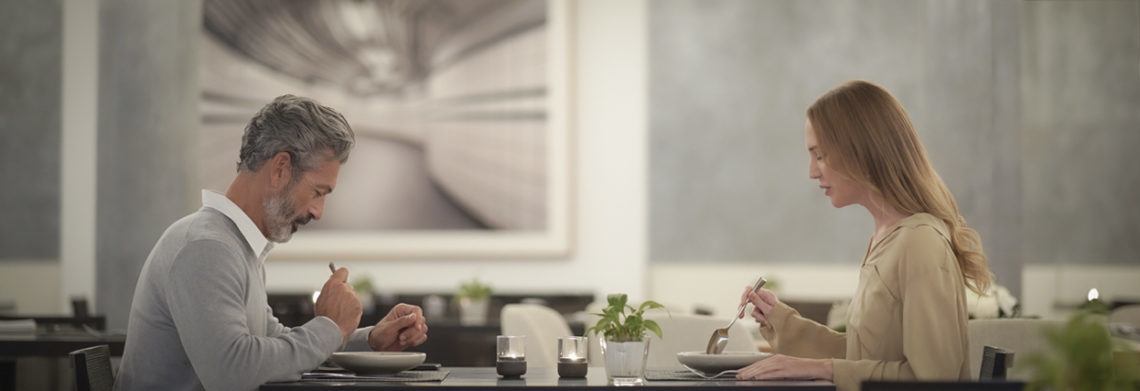Subscribe to our newsletter
Receive news and benefits on health and wellness.

SHA Magazine Healthy Nutrition
“Sleep is the new sex“. Everyone wants it and is willing to pay for good, restful, quality sleep, but few get it.
“The advent of artificial light has disrupted human habits that are the result of thousands and thousands of years of evolution that followed the cycle of day and night. For many years, within two hours of sunset, people slept because there was nothing else to do. In those hours of sleep we recovered, fixed our memories, rested and cleaned our brains. The alteration of this circadian rhythm due to the arrival of artificial light is the reason why it is increasingly difficult to sleep“, explains Dr Alejandro Bello, sleep expert at SHA Wellness Clinic.
Dining late is a deep-rooted habit in Western and Mediterranean culture that completely disrupts the conditions the body needs to prepare for a deep and restful sleep. “We used to go to bed early and no one had dinner so late, now you can order food at three in the morning and stay up late watching a series until the early hours of the morning. And it’s not just artificial light that interferes, there’s also the internet with algorithms specifically designed to capture our attention and electronic devices that emit blue light. Modern society wants you to either produce or consume, and while you sleep you do neither one nor the other“, reflects Dr Bello.
The expert points out that we are not designed to have a late dinner. “Ideally, we should eat dinner two to three hours before going to bed because the same areas of the autonomic nervous system that regulate our vital functions are involved in sleep and digestion. This system is normally activated for sleep, relaxation or digestion. If the body is digesting then it is not investing all its energy in sleep and repair.”
If you find it hard to fall asleep after a large dinner, your body is probably too busy doing other things to slow down and regulate the temperature to prepare the body for restful sleep. “When you have a late dinner and then fall asleep, even if you are consciously asleep, your autonomic system is very active with digestion. It has been shown in several studies that when we go to bed without having finished digesting, the heart rate is still quite high, indicating a high activity of the autonomic nervous system and that resources are being shifted from one activity to another. You will actually start sleeping when digestion is finished“, explains Bello.
All activities of the body, including sleeping, require an investment of energy. Depending on the moment you decide to invest it in one activity or another. If you invest in digesting because you have had a late dinner, you will not invest in sleeping, and that has consequences.
“The golden hours of deep sleep (REM sleep) are between 22:00 (ten o’clock at night) and 01:00 in the morning. Therefore, the ideal time for dinner would be between 7 and 8 p.m., which coincides approximately, at least in winter, with the time of sunset“, recommends the expert.
Recent scientific studies have shown that regularity is more important than the number of hours of sleep. “The body likes routine: going to bed at the same time every night. Regularity gives the body information and time to prepare for sleep in advance“, explains Dr Bello, who adds that a late dinner is even worse for sleep if alcohol, even a glass of wine, is consumed during dinner.
“Alcohol greatly affects the quality of sleep. Even if you sleep, it will not be a quality sleep because sleep will be lighter and the most restorative phases will not be reached. In addition, we will have more unconscious awakenings during the night. Alcohol affects brain neurochemistry and sleep architecture. Just because you slept for eight hours does not mean that your sleep was of good quality“, warns the expert.
Coffee is another big enemy of restful sleep, even if you drink very little of it and your last one is before three in the afternoon. “The half-life of coffee – the average time between drinking it and half of the caffeine consumed disappearing from the bloodstream – is between ten and twelve hours. Even if you drink coffee alone in the morning at bedtime you can still have a quarter of the amount of caffeine consumed circulating in your blood.”
Late dinner is a shot in the arm to the deep, restorative sleep we need every night for cellular repair of our bodies. This is not a myth. Studies and clinical trials confirm it. Working hard and getting little sleep has for many years been the moral and ethical epitome of productivity and performance. However, the social paradigm is shifting, because scientific studies prove the opposite: sleep is our only superpower.
Receive news and benefits on health and wellness.
